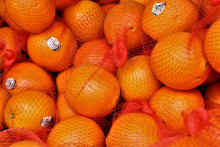The Times Colonist reports that a nesting pair of peregrine falcons, along with a juvenile born this year, have been landing on the upper decks and rooftop of the Promontory residential tower in Victoria, BC, where penthouse owner Fred Welter has set up a nesting box complete with cameras poised to stream any action.


Often considered a symbol of shrinkflation, orange juice is shrinking again, Radio-Canada reports. A modified bottle of the Tropicana brand is making its way into grocery stores in a format reduced to 1.36 liters.
Will other brands follow in Tropicana's footsteps?

The price of food has been increasing since the pandemic. Even poutine is not immune to inflation: the price of sunflower oil used in fryers has doubled, and even the price of potatoes has risen.

Metro announced a 14.6% drop in its net profit for the third quarter, ending July 6, 2024, compared to the same period last year. Its turnover increased by 3.5% to reach 6.65 billion.
Congratulations to McGill Plant Science Professor Valerio Hoyos-Villegas, 2024 winner of the North American Plant Phenotyping Network (NAPPN)'s Early Career Scientist Award! This award recognizes an early career scientist making important contributions to plant phenotyping.
Congratulations to the recipients of the 2024 Interdisciplinary Research Development (IRD) Award, announced earlier this month! As part of the Computational & Data Systems Initiative, these awards are presented by the McGill Collaborative for AI & Society and encourage interdisciplinary research aimed at understanding and positively influencing the impact of AI on society through projects targeting a range of issues.
In a recent article, L'actualité does a deep dive into small-scale farm enthusiast, author, and star of the popular series Les fermiers Jean-Martin Fortier (BA'02). This "rock-star" of organic microfarming in Quebec is highly regarded by many, though some have raised concerns that his presentation of the business as profitable and accessible to all is overly optimistic.

In April, the City of Montreal announced it wanted to accelerate tree planting by incentivizing business owners to plant trees on their property, offering to foot 50 per cent of the bill, CTV News reports, in an effort to reduce heat islands, improve air quality and help drain rainwater.
The Natural Sciences and Engineering Research Council of Canada (NSERC) has awarded 101 McGill research projects funding from its Discovery Grants competition for a total investment of $23.5 million, including $639,500 for eight projects submitted by researchers in the Faculty of Agricultural and Environmental Sciences.
The Discovery Grants support ongoing programs with long-term goals, recognizing the creativity and innovation that are at the heart of all research advances.

Loblaws and its principal shareholder, George Weston, will pay $500 million to settle a class action lawsuit the company was facing in connection with a bread cartel. The people behind the lawsuit accused the country's major food chains of colluding on the price of bread to increase their profit margins.

Please join us in congratulating Mehran Dastmalchi, Ph.D., Assistant Professor in Plant Science, on receiving the prestigious Arthur C. Neish Award from the Phytochemical Society of North America (PSNA). The 63rd annual PSNA meeting took place in Monterrey, Mexico from July 15–19, 2024, where Professor Dastmalchi presented his lab's research in a keynote speech. Among the accomplishments recognized at the conference were his group’s findings on the biosynthesis of medicinal alkaloids in the Madagascar periwinkle (Catharanthus roseus).

Funding supports groundbreaking research in the natural sciences and engineering
The Natural Sciences and Engineering Research Council of Canada (NSERC) has awarded 101 McGill research projects funding from its Discovery Grants competition for a total investment of $23.5 million.
The Discovery Grants support ongoing programs with long-term goals, recognizing the creativity and innovation that are at the heart of all research advances.

In 2019, while doing post-doctoral research in McGill's Department of Natural Resource Sciences, Qinhong Cai (better known as Tammy) travelled to Nunavut to join the Oceans Protection Plan, a federal initiative designed to improve marine safety and increase the protection and restoration of coastal and seaway ecosystems. Cai, an environmental engineer, was sent to monitor hydrocarbon contaminants and microbial genomics along the Kivalliq transportation corridor.

Patrol drones deployed in May to New York City beaches to look for sharks and struggling swimmers are ruffling feathers. Seabirds have been attacking the drones as if they are predators, flying and swooping at the machines while vocalizing.

Adelina Lameiras and David Wees are the latest winners of the Dean of Students Award for Excellence in Undergraduate Academic Advising.
Adelina Lameiras, Student Affairs Administrator at the Schulich School of Music, was recognized in the Administrative Staff category.
David Wees, a Faculty Lecturer and Associate Director of the Farm Management and Technology Program in the Faculty of Agricultural and Environmental Sciences, won in the Academic Staff category.
